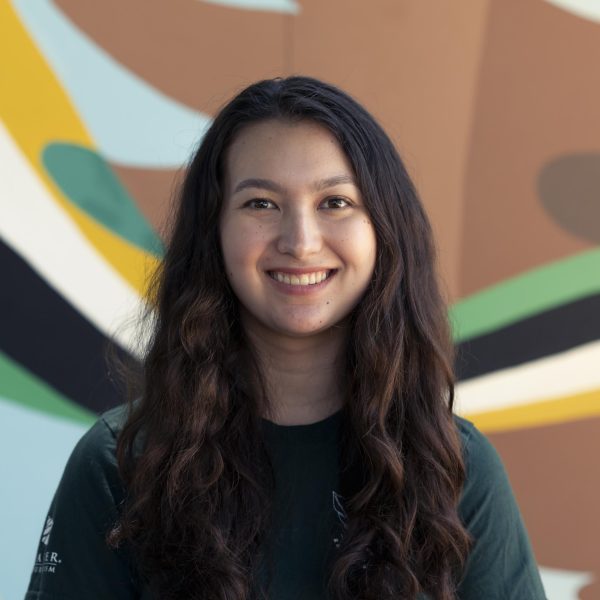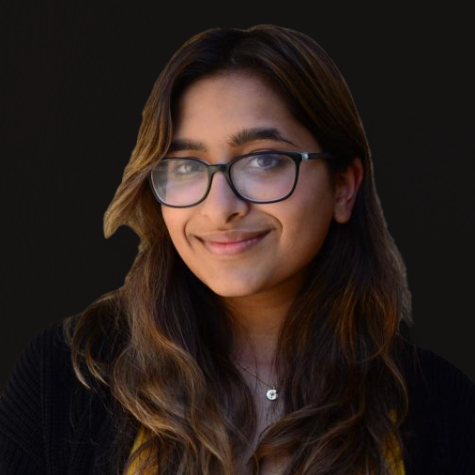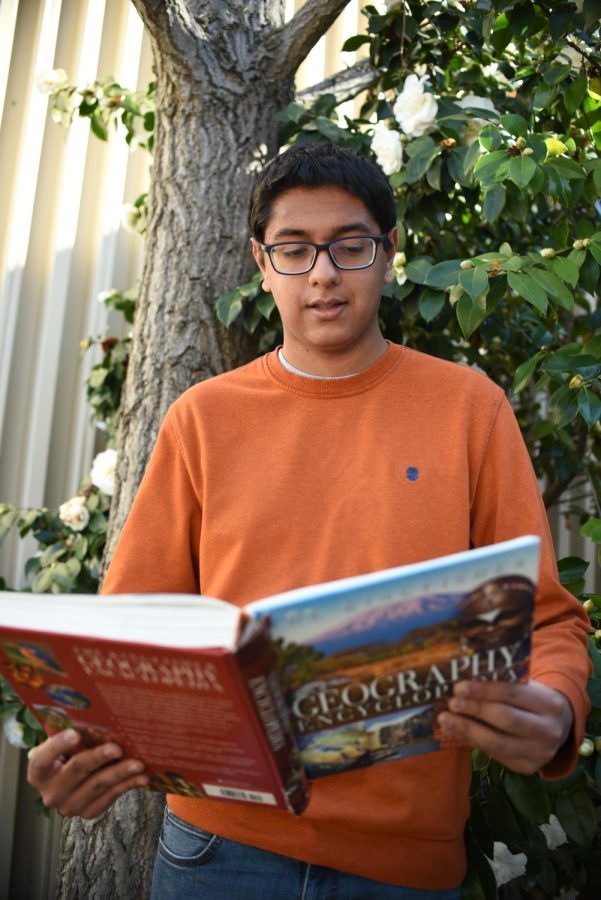Humans of Harker: Failure vs. Finality
Aditya Tagore’s compassion and global perspective drive his research in computational biology
“If you only see failure as finality, then you’ll never continue past that. And you’ll never know if you could have reached success. Failure is temporary, because there may be paths to success that you never even thought of. And unless you keep persisting and trying new ways of approaching the problem, you’ll never know if you could have been successful,” Aditya Tagore (12) said.
Flashback to March 2020. Schools nationwide are announcing a two week hiatus, COVID-19 rates are skyrocketing and not a roll of toilet paper remains on store shelves. Uncertainty hangs thick in the air, and Aditya Tagore (12), then a sophomore, remembers thinking that he could help but feel powerless. That is, until he began research as an intern at Stanford University, where he would go on to develop an app that identifies whether a person has coronavirus based on heart rate data from a smartwatch. Because Aditya’s own mother is a doctor, he remembers the sense of urgency he felt listening to her tell stories from the front lines.
“[My mother] made me more alert as to how serious the pandemic was, and how important it was to end it,” Aditya said. “That was one of the contributing factors to me doing research in computational biology, because it was so relevant to the pandemic.”
Aditya’s journey with machine learning and computer programming began at Harker in the Advanced Programming summer course his freshman year, where he remembers the moment he fell in love with coding. The class needed to guide a robot through a maze, a problem which initially seems complex but has an easy answer.
“Discovering that problem-solving aspect of [programming], that there could be such a simple solution to this seemingly complicated problem, that was really interesting to me,” he said. “And that really motivated my interest, knowing that it has such a broad range of applications.”
Given this flexibility, Aditya hopes to integrate his coding skills with his other interests, such as geography. Unlike programming, which only came into his life in high school, geography has enraptured him nearly his whole life. Throughout his childhood, he remembers fond hours spent devouring maps at his computer, attempting to sate an innate curiosity about the world around him and why it works the way it does.
Fusing his affinity for geography and politics with his knowledge of computational biology, one of Aditya’s long term goals is to identify underserved communities and hospitals and provide them with algorithms to compensate for the resources they lack. Already, he strives to give back to his community by tutoring local kids preparing for the geography bee.
“[Geography] breaks down these preconceived notions we have about other cultures or other groups of people,” he said. “Learning more about how [people] live or the location they’re in and their history … there’s all these different things about their background that illuminate why the current situation [exists] or the current political tensions that may arise in their area.”
His friends attest to his keen perspective and mature worldview, both globally and on a more personal level, where he demonstrates a unique compassion. Longtime friend and classmate Saahas Kohli (12) remarked that he was drawn in by Aditya’s kind and gentle nature.
“He was more instantly friendly than anyone else I’ve ever met,” Saahas said. “He’s not the sort of person to ever say something bad about someone. He has this sense of absolute honor. He’s good in every way.”
Fellow student and close friend Vinay Sudarsanam (12) also discussed his compassion, which he witnessed during his time spent with Aditya in their many shared classes throughout high school, such as Modern International Affairs.
“Lots of people are very focused on what’s going on with themselves, [but Aditya] is always looking out for the people around him and his friends and making sure they’re having as good a time as he is, which I think is really special,” Vinay said.
Despite Aditya’s storybook ambitions, the road has not always been easy, ranging from navigating HIPAA protocol, an international ethical standard in medicine, to appealing to the Institutional Review Board, which oversees and regulates biomedical research nationwide. Still, he feels he learned many valuable lessons throughout his experiences in research, such as collaborating with others.
“We had datasets with millions of data points and everyone had a very specific task,” Aditya said. “It was very critical that we worked with each other to develop solutions and bounce ideas off each other. We were learning to realize that your idea might not always be the best one, and it’s okay to accept that … Conversely, there are times when your ideas might be better than others and it [takes] saying, ‘I think my idea is better. I think we should try this.’”
Learning, Innovation and Design Director Diane Main, who is Aditya’s advisor, praised his ability to work with others, having noted his reliability and easy going personality throughout her four years with him.
“You can count on him to be there and be part of the group and participate in whatever,” Main said. “[Aditya’s the] one guy that’s comfortable with everybody. His friends want him around and seek him out.”
Above all, Aditya curated a unique persistence, without which he would not have been able to publish his paper and app, especially considering the strict standards within the scientific community. Quarantining augmented the difficulty of every already complex step, like writing the algorithms, debugging and tackling insufficient data. He credits his persevering mindset to the experience.
“If you only see failure as finality, then you’ll never continue past that,” Aditya said. “And you’ll never know if you could have reached success. Failure is temporary, because there may be paths to success that you never even thought of. And unless you keep persisting and trying new ways of approaching the problem, you’ll never know if you could have been successful.”

Katerina Matta (12) is an Editor-in-Chief of the Winged Post, and this is her fourth year on staff. This year, she looks forward to experimenting with...

Esha Gohil (12) is the co-editor-in-chief of Humans of Harker and the photo editor of Harker Aquila. This is her fourth year on staff, and this year she...


















![“[Building nerf blasters] became this outlet of creativity for me that hasn't been matched by anything else. The process [of] making a build complete to your desire is such a painstakingly difficult process, but I've had to learn from [the skills needed from] soldering to proper painting. There's so many different options for everything, if you think about it, it exists. The best part is [that] if it doesn't exist, you can build it yourself," Ishaan Parate said.](https://harkeraquila.com/wp-content/uploads/2022/08/DSC_8149-900x604.jpg)




![“When I came into high school, I was ready to be a follower. But DECA was a game changer for me. It helped me overcome my fear of public speaking, and it's played such a major role in who I've become today. To be able to successfully lead a chapter of 150 students, an officer team and be one of the upperclassmen I once really admired is something I'm [really] proud of,” Anvitha Tummala ('21) said.](https://harkeraquila.com/wp-content/uploads/2021/07/Screen-Shot-2021-07-25-at-9.50.05-AM-900x594.png)







![“I think getting up in the morning and having a sense of purpose [is exciting]. I think without a certain amount of drive, life is kind of obsolete and mundane, and I think having that every single day is what makes each day unique and kind of makes life exciting,” Neymika Jain (12) said.](https://harkeraquila.com/wp-content/uploads/2017/06/Screen-Shot-2017-06-03-at-4.54.16-PM.png)








![“My slogan is ‘slow feet, don’t eat, and I’m hungry.’ You need to run fast to get where you are–you aren't going to get those championships if you aren't fast,” Angel Cervantes (12) said. “I want to do well in school on my tests and in track and win championships for my team. I live by that, [and] I can do that anywhere: in the classroom or on the field.”](https://harkeraquila.com/wp-content/uploads/2018/06/DSC5146-900x601.jpg)
![“[Volleyball has] taught me how to fall correctly, and another thing it taught is that you don’t have to be the best at something to be good at it. If you just hit the ball in a smart way, then it still scores points and you’re good at it. You could be a background player and still make a much bigger impact on the team than you would think,” Anya Gert (’20) said.](https://harkeraquila.com/wp-content/uploads/2020/06/AnnaGert_JinTuan_HoHPhotoEdited-600x900.jpeg)

![“I'm not nearly there yet, but [my confidence has] definitely been getting better since I was pretty shy and timid coming into Harker my freshman year. I know that there's a lot of people that are really confident in what they do, and I really admire them. Everyone's so driven and that has really pushed me to kind of try to find my own place in high school and be more confident,” Alyssa Huang (’20) said.](https://harkeraquila.com/wp-content/uploads/2020/06/AlyssaHuang_EmilyChen_HoHPhoto-900x749.jpeg)



